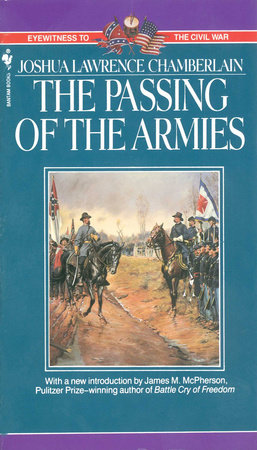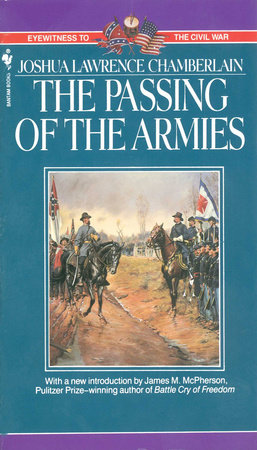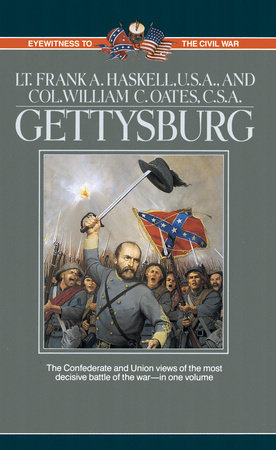Excerpt
The Passing of Armies
INTRODUCTORY
HISTORY is written for the most part from the outside. Truth often suffers distortion by reason of the point of view of the narrator, some pre-occupation of his judgment or fancy not only as to relative merits but even as to facts in their real relations. An interior view may not be without some personal coloring. But it must be of interest, especially in important transactions, to know how things appeared to those actually engaged in them. Action and passion on such a scale must bear some thoughts “that run before and after.” It has been deemed a useful observance “to see ourselves as others see us,” but it may sometimes be conducive to a just comprehension of the truth to let others see us as we see ourselves.
The view here presented is of things as they appeared to us who were concerned with them as subordinate commanders,—having knowledge, however, of the general plan, and a share in the responsibility for its execution. This is a chapter of experiences,—including in this term not only what was done, but what was known and said and thought and felt,—not to say, suffered; and in its darkest passages showing a steadfast purpose, patience, and spirit of obedience deserving of record even if too often without recompense, until the momentous consummation.
These memoirs are based on notes made nearly at the time of the events which they describe. They give what may be called an interior view of occurrences on the front of the Fifth Corps, Army of the Potomac, during the last essay in Grant’s Virginia campaign. This was so distinctive in character, conditions, and consequences, that I have ventured to entitle it “The Last Campaign of the Armies.”
I trust this narrative may not seem to arrogate too much for the merits of the Fifth Corps. No eminence is claimed for it beyond others in that campaign. But the circumstance that this Corps was assigned to an active part with Sheridan during the period chiefly in view—the envelopment and final out-flanking of Lee’s army—warrants the prominence given in this review.
It may be permitted to hope that this simple recital may throw some light on a passage of the history of this Corps, the record of which has been obscured in consequence of the summary change of commanders early in the campaign.
The Fifth Corps had a certain severity of reputation quite distinctive in the comradeship of the army. Early in its history, Porter’s Division—the nucleus of it—had drawn the especial praise of General McClellan for its soldierly bearing and proficiency, being unfortunately referred to in orders as a model for the rest of the army. This had the effect of creating on the part of others a feeling of jealousy towards that Division or an opposition to apparent favoritism shown its commander, which was extended to the whole Corps on its formation in the summer of 1862, when the Regulars were assigned to it as its Second Division, and the choice Pennsylvania Reserves became its Third Division. This feeling certainly was neither caused nor followed by anything like boastfulness or selfcomplacency on the part of the Fifth Corps; but, if anything, created a sense of responsibility and willingness to “endure hardness as good soldiers” to make good their reputation. And no doubt the discipline of the Corps was quite severe. Most of its commanding officers in the superior grades were West Pointers, and experienced officers of the old army, and prided themselves on strict observance of Army Regulations and military habitudes. The required personal relations between officers and men were quite novel and but slowly acquiesced in by volunteers who were first-class citizens at home,—many of them equal to their official “superiors.” For example: my young brother, Tom, when a private in my regiment came sometimes to see me in my tent, but would not think of sitting down in my presence unless specially invited to do so. But he went home from Appomattox Lieutenant-Colonel of his regiment and Brevet-Colonel of United States Volunteers—and this on his own merits, not through any suggestion of mine.
Passages in the history of the Corps had endeared its members to each other, and brought out soldierly pride and manly character; but boastful assertion and just glorification of their Corps were remarkably less manifest among its members than with those of every one of the other splendid Corps of the Army of the Potomac.
It may not be improper to state here that there was a manifest prejudice against the Fifth Corps at Government Headquarters,—particularly at Stanton’s,—on account of the supposed attachment for McClellan and Porter among its members. This was believed to be the reason why no promotion to the rank of General Officers was made in this Corps for a long time, unless secured by political influence. Brigades and even divisions were in many cases commanded by colonels of State regiments. This worked a great injustice in the fact that officers of similar commands in the different Corps were not of similar relative rank, and some were therefore unduly subordinated to those who were not in fact their superiors in service. There was also a practical injustice in the added expense of supporting headquarters above lineal rank, which, with no extra pay or allowance, quite cancelled the compliment.
It had not been the habit in the Fifth Corps to encourage detailed reports on the part of subordinates, and in the rush and pressure of this last campaign there was less opportunity or care than ever for such matters, and the impressiveness of its momentous close left little disposition to multiply words upon subordinate parts or participants. The fact also of an early and sudden change in the grand tactics of the campaign confused the significance and sometimes the identity of important movements; and the change of commanders in the crisis of its most important battle induced consequences which, even in official reports and testimony afterwards called for, affected the motive in sharply defining actions where personal concern had come to be an embarrassing factor.
Very naturally, the immediate reports of those days are meager in the extreme; and very much of what has come out since, partaking of official character, has been under the disadvantage of being elicited as ex parte testimony before military tribunals where the highest military officers of the Government were parties, and the attitudes of plaintiff and defendant almost inevitably biased expression.
In the strange lull after the surrender of Lee and the sudden release from intense action and responsibility, but as yet in the field and in the active habit not readily relinquished, it occurred to me, impressed with the deep-wrought visions of those tragic days, to write down, while fresh in mind and mood, some salient facts of that last campaign, within my personal knowledge and observation, to serve for fireside memories in after years, and for the satisfaction of some others who had given of their best for the great issues in which these scenes were involved.
It has been suggested to me of late that these reminiscences might be of interest to a wider circle whose hearts respond to the story of things done and suffered for truth and honor’s sake, which they would have gladly shared in their own persons. In preparing for this more exacting demand I have availed myself of additional material which, in the later consolidations in the Fifth Corps, successive assignments brought into my hands: particularly the office-copy of the Corps field-orders for the last campaign, and also the invaluable original records of the Medical Inspector of the Corps for that period. Later, came the (now suppressed) volumes of the records of the Warren Court of Inquiry, and the extensive Records of the War of the Rebellion. In revising this personal memoir, I have diligently consulted these, but have found no occasion to correct or modify the account given from my own point of view, however limited. Qualifying or corroborative testimony from these sources, when introduced, has been clearly indicated.
I confess some embarrassments of a personal nature in giving forth certain passages of this record. These facts, however simply stated, cannot but have some bearing on points which have been drawn into controversy on the part of persons who were dear to me as commanders and companions in arms, and who have grown still dearer in the intimacies of friendship since the war. Alas! that no one of them can answer my greeting across the bar. I feel therefore under increased responsibility in recounting these things, but assure myself that I know of no demand of personality or partisanship which should make me doubtful of my ability to tell the truth as I saw and knew it, or distrust my judgment in forming an opinion.
J.L.C.






